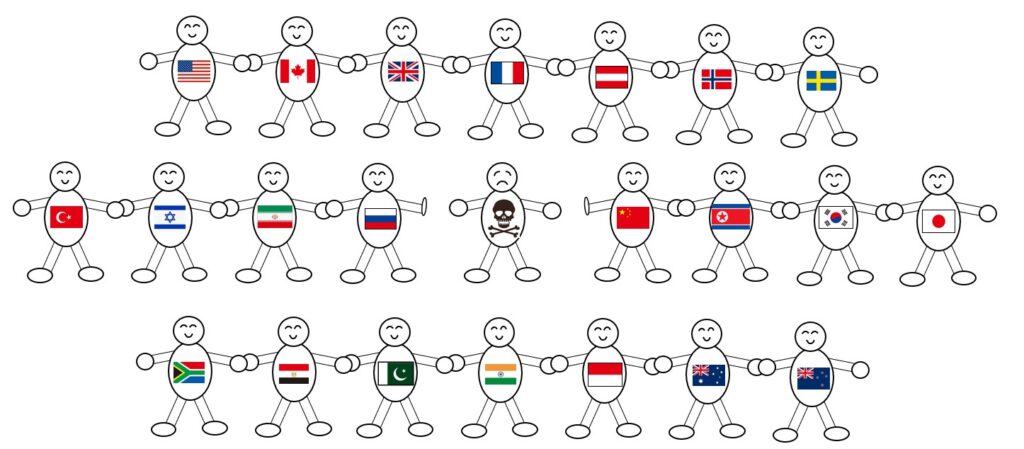Introduction
There has been growing concerns about the use of nuclear weapons in spite of the Treaty on the Prohibition of Nuclear Weapons (TPNW), which is considered as a great millstone for the abolition of nuclear weapons, came into effect in 2021. Although, many peace groups are appealing for the horror of nuclear weapons, many people are beginning to consider that possessing such horrible weapons can avoid being invaded. Unfortunately, TPNW has a difficulty to realize the total abolition of nuclear weapons since nuclear-weapon states seem never to ratify TPNW. This is probably because any nuclear-weapon state cannot abandon nuclear weapons as long as its enemy state is possessing nuclear weapons.
Therefore, a new multilateral treaty is proposed. It prescribes sanctions against a state which actually uses nuclear weapons in a war. As many states support the idea of TPNW, nuclear weapons should never be used. Therefore, if a state actually uses nuclear weapons, the state should be imposed sanctions. Conventionally, the sanctions are discussed and decided afterward in an Emergency Special Session of the United Nations General Assembly. However, since there should not be no sanctions to the state, some sanctions can be prescribed beforehand. Predetermining extremely severe sanctions can make nuclear-weapon states to consider that using nuclear weapons is quite difficult.
Proposed articles for the new treaty
Since it is difficult to impose a military punishment to a state which possess nuclear weapons, the treaty consists of the following three articles as the sanctions.
- Each state shall stop every trade between the state which uses nuclear weapons, except foods for the citizens if necessary. This is in effect for more than 20 years.
- Each state shall prohibit the entry of every people from the state which uses nuclear weapons, except for political exiles. This is in effect for more than 10 years.
- If a state breaks the article 1 or 2, all the other states shall stop every trade between the state. This is in effect for 3 years.
The proposed treaty does not target any nuclear-weapon state. It does not care about the possessing, the production, and the experiment of nuclear weapons. Therefore, any nuclear-weapon state can ratify the treaty, which is different from TPNW. A member state should just impose the sanctions on a state which actually uses nuclear weapons even if the nuclear-weapon attacked state is a potential enemy to the member state.
The reason for adding the article 3 is to eliminate resistance to impose the sanctions. If a state which uses nuclear weapons is a major resource exporter, some member state may hesitate to impose the sanctions without penalty.
Concerning a retaliatory nuclear attack
The sanctions should also be imposed to a state which makes a retaliatory nuclear attack in response to being nuclear attacked. The reason is that a claim of being nuclear attacked may be a clever fake in order to make a nuclear attack. Also, the escalation of the retaliatory nuclear attacks must never be tolerated.
However, in return for enduring the retaliation, the following article should be added.
4. Each state shall provide every-possible rescue and assistance to a member state which is nuclear attacked.
This is similar to the article 6 of TPNW. Even if a nuclear attacked state is a potential enemy, every member state should give the rescue and the support.
The idea of banning the retaliatory nuclear attack may not be supported by nuclear-weapon states. However, if a nuclear attacked nuclear-weapon state really want to make a retaliatory nuclear attack, the state can do so regardless of facing the sanctions. Actually, if the number of member states is small, the sanctions are not severe.
What can be expected
If more than 150 states become the member in the future, even if it takes 100 years, the sanctions become quite effective. Then, there is almost no risk of being nuclear attacked. Therefore, a nuclear-weapon state can be the member without abandoning nuclear weapons until the sanctions become effective.
If a member state is importing large amount of resources from a state which uses nuclear weapons, the member state may suffer a shortage of them. Therefore, all the member states should need to import resources from non-nuclear weapon states with a priority over nuclear-weapon states. Consequently, nuclear-weapon states will need to abolish nuclear weapons in order not to decrease the export.
The proposals presented above may be subject to revision by the discussions with people who wish to abolish nuclear weapons.

If you have a message, please send an e-mail to:
